Eat, pray, practice: Veterinary medicine in India
This veterinarian's journey came full circle when he returned to India to open the first private veterinary college in his homeland.
Next >
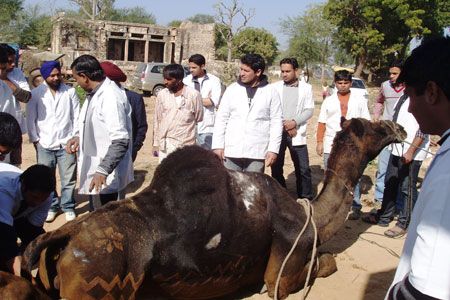
Apollo College veterinary students examine a camel with impaction in Dayarampura Village in India.
When Srinivasan Ramanathan, DVM, had the opportunity go to the United States he could hardly believe it.
“I thought, ‘Wow, I have really gone to heaven.' I could have flown there myself because I was so happy,” Ramanathan says.
Like most children in Chennai, India, Ramanathan grew up with livestock nearby, and this played a significant role in why he wanted to become a veterinarian. When he was 8 years old his family's landlord owned three cows. He witnessed firsthand a veterinarian bringing new life into this world-and he was hooked.
“That was the magic moment. I thought this would be a great profession to be in, and 50 years later I still feel the same way,” Ramanathan says.
Click the Next button to continue reading
All photos courtesy of Dr. Srinivasan Ramanathan
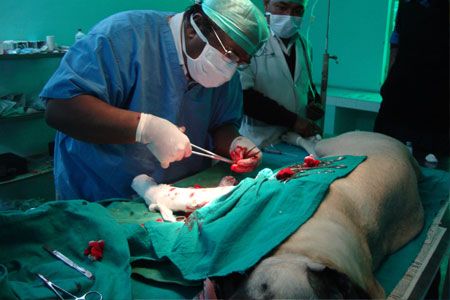
Dr. Srinivasan Ramanathan is shown doing what he loves most-surgery. Here he's performing a tumor removal on a police officer's Labrador retriever.
He graduated from a veterinary college in Chennai, but Ramanathan felt the best training and educational opportunities were in America. So in 1978 when a humane society called Associated Humane Societies offered him an internship in Newark, N.J., he didn't hesitate. After that experience, he took all of the American licensing exams and practiced in Virginia and Florida before settling down in Pennsylvania. Before he knew it he was running three veterinary practices simultaneously.
“I'm getting choked up-America is the greatest land with the greatest opportunities,” Ramanathan says.
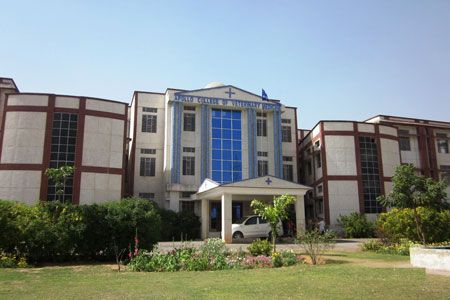
Apollo College is the first private veterinary college not only in Rajasthan, but in the entire country of India.
Little did he know he'd be presented with an opportunity that would take him right back to his roots. In 1997, the chief minister of Rajasthan, India, came to the United States and shared his goal of opening a veterinary college-and asked Ramanathan for help. At that time, there was only one veterinary school in Rajasthan and, like all colleges in India, it was government-owned.
“Veterinary medicine in India is in high demand, just like in America, and there's a short supply of veterinarians,” Ramanathan says. “The chief minister had the vision: If the government cannot supply the need, why not go to the private sector?”
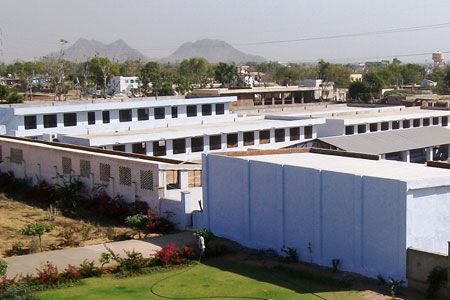
The Instructional Livestock Farm Complex where Apollo Veterinary College houses its livestock (e.g., sheep, goats, cows, buffalo, horses, camels, poultry and pigs).
Ramanathan says his American colleagues thought he was crazy to attempt such a feat in a country with so many bureaucratic issues, social class norms and limiting constraints. However, he decided to follow the teachings of Mahatma Gandhi and accept the challenge to return to the land of his own work-he knew the invaluable role veterinarians and animals play in India's livelihood. With a population of more than one billion, India is a very large country and there are many mouths to feed, Ramanathan says.
“My mother was always encouraging us, ‘Whenever you can, do something for the common good.' Then, she said, everybody will be more in harmony with each other and there won't be so much of a caste system, social status and discrimination,” Ramanathan says. “So that was in me. When this opportunity came, I was quite inspired.”
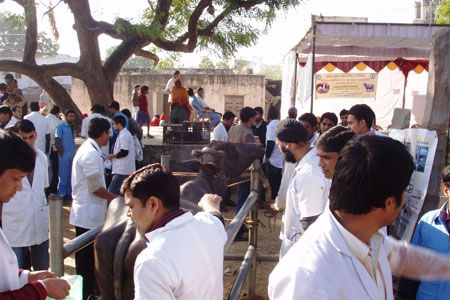
Veterinary students assist clinicians at a farmers' fair at Nayla Village in India.
He joined the education initiative and became a cofounder of the Apollo College of Veterinary Medicine. It's the first private veterinary college not only in Rajasthan but in the entire country, Ramanathan says. In 2003, the college opened in a rented building and by 2006 the school's campus was finally completed. It's a five-year veterinary medicine program that students can apply for right out of high school. The school accepts 60 students annually, but receives 400 to 450 applications every year.
“American schools emphasize the hands-on, practical application,” Ramanathan says. “This was my chance to bring the American experience to make small but steady progress towards better patient care in India.”
Apollo College adopted several villages nearby and students and staff visit these communities to provide veterinary care to livestock. They commonly treat a large population of working animals: camels, horses, donkeys and so on.
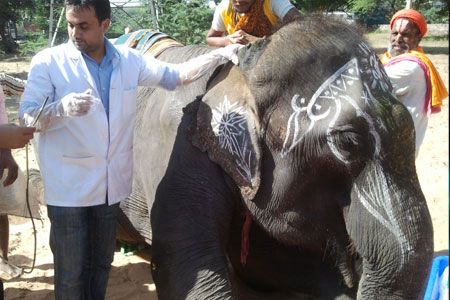
Mayank Lamba, DVM, attends to an elephant with a severe abscess.
“If there are any serious issues or surgical problems, we bring them to the large animal hospital, but most of the problems are solved at the farmer's doorstep,” Ramanathan says.
He says if an animal is suffering, the problem goes beyond love and compassion-it's losing its economic value for the owner. Recently, a villager brought in an elephant with a severe abscess.
“These are all folks who don't have much, but this elephant is part of their economic reality. There are five or six families dependant on this one animal to make a living,” Ramanathan says.
Students don't do any diagnosis on the animals, but they do actively assist clinicians. In the elephant's case, they cleaned the abscess and packed it with gauze. All of these skills and experiences add up, Ramanathan says.
“They touch the patients and in many other colleges in India that is simply not the case,” he says.
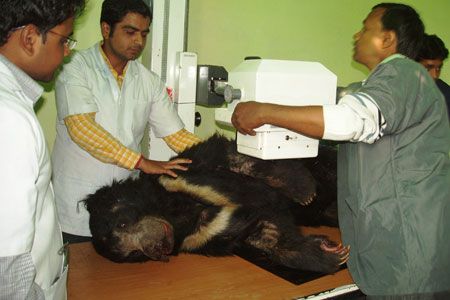
Rakesh Mishra, DVM, takes a radiograph of a bear with a fractured elbow.
Ramanathan says that the Apollo College supports former Prime Minister Jawaharlal Nehru's initiative to help India take the forefront in technology. The prime minister was passionate about starting the Indian Institutes of Technology (IIT), which Ramanathan says is the flagship institute to bring India's agro-economy-based country into the technological world. IIT graduates are some of the greatest leaders in America and the rest of the world in their chosen field, he says.
“And that's exactly what God has given me-an answer to thays. “And that's exactly what God has given me-an answer to that prayer.”
Journey to India
Srinivasan Ramanathan, DVM, welcomes all veterinarians to come share their knowledge with the students of Apollo College of Veterinary Medicine. Visit apollocolvet.org or e-mail [email protected] to plan your visit.